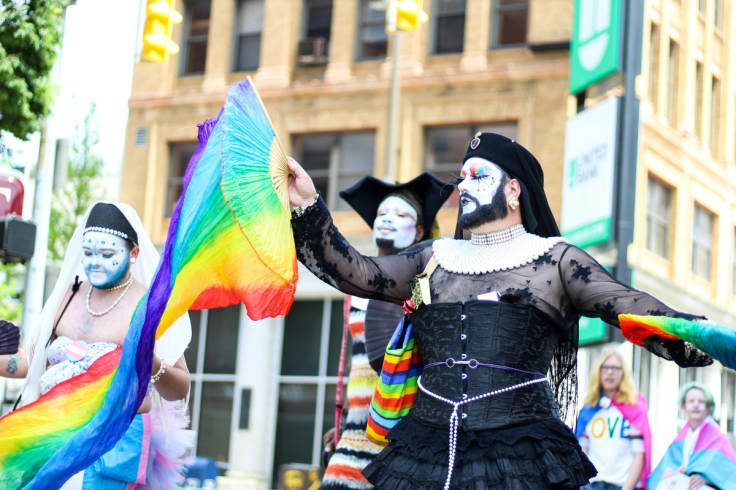Manchester Pride 'Owes Thousands' To Performers As Financial Trouble Mounts
Drag artists Saki Yew and Zahirah Zapanta call out organisers

In the glittering aftermath of Manchester Pride's August 2025 celebration, performers and suppliers have erupted in frustration, claiming the event owes them thousands in unpaid fees amid spiralling financial troubles.
This iconic LGBTQ+ festival, which drew over 100,000 revellers to its three-day extravaganza headlined by Leigh-Anne, Billy Porter, Olly Alexander, and Nelly Furtado, now teeters on the brink of administration, casting shadows over its vibrant legacy.
As the Equity union rallies affected artists and organisers promise clarity by 22 October 2025, the saga underscores the precarious funding landscape for Pride events in an era of economic strain.
Unpaid Voices: Performers' Pleas Grow Louder
Drag performer Saki Yew, fresh from RuPaul's Drag Race UK, led the chorus of discontent on 16 October 2025, revealing her collective remains unpaid a 'big sum of money' for August performances. Fellow artist Zahirah Zapanta echoed the sentiment, posting on Instagram: 'It is deeply disappointing to share that Manchester Pride has failed to pay me, along with many other artists who performed at the events.'
Backstage crew member Chris O'Connor pursued £2,050 through small claims court, while an anonymous supplier despaired over nearly £1,000 for signage, highlighting how these shortfalls cripple livelihoods amid rent pressures.
Equity swiftly intervened, branding the 60-day payment terms as 'unnecessarily long' and warning of contract breaches by month's end. Yew captured the collective anguish: 'As performers, we're used to waiting for money but there's no communication and no answer. A lot of performers are starting to give up hope of being paid.'
A collective letter to organisers decried the situation as 'a breach of trust and legality', amplifying calls for accountability in a festival long seen as a cornerstone of queer celebration. These revelations not only strain individual purses but erode the trust underpinning community-driven festivals.
Board Speaks Out Amid Financial Turmoil
Manchester Pride's board of trustees broke weeks of silence on 16 October 2025 with an Instagram statement, admitting: 'We recognise that there has been a period of silence from us, whilst we have taken legal and financial advice.' They vowed to consult staff, interns, artists, contractors, and suppliers, prioritising 'the wellbeing and safety of our staff' and shielding them from backlash.
An update is expected by 22 October 2025, as advisers explore a 'best way forward' amid insolvency whispers. Sources close to the situation revealed fruitless funding efforts, with 2023's £467,000 loss lingering as a stark reminder of chronic cashflow woes. The board urged kindness, stating: 'It is the board that takes responsibility for our decisions based on advice and guidance, and not our staff.'
Attitude Magazine's X post captured the mounting tension: 'Manchester Pride reportedly set to enter administration as performers claim they're owed thousands.'
Manchester Pride reportedly set to enter administration as performers claim they’re owed thousands https://t.co/Sedqk3zVqm
— Attitude Magazine (@AttitudeMag) October 16, 2025
This pivot from festival highs to fiscal lows spotlights governance gaps, prompting scrutiny of how ticket revenues—ranging from £15 entry to over £200 VIP—failed to fortify reserves against rising costs.
Can Manchester Pride Be Saved?
As administration looms, Manchester's LGBTQ+ community grapple with the fallout, fearing a potential loss of its 2026 celebration, an event that once united over 100,000 in joyful defiance. Equity is urging artists to log claims, while city council overtures hint at potential rescue bids to preserve this cultural powerhouse.
Performers like Yew, who invested 'weeks and weeks of rehearsals', demand resolution: 'We put in the hard work... so give us an answer.' Broader implications ripple: unpaid suppliers face closures, threatening the ecosystem that fuels Pride's spectacle. Past controversies, like 2021's funding cuts amid executive pay hikes, fuel demands for transparent reforms.
Yet, community solidarity shines, with calls for collective action to reboot the event sustainably. This crisis, though harrowing, could catalyse stronger safeguards, ensuring Manchester Pride endures as a beacon of resilience and inclusion for generations.
© Copyright IBTimes 2025. All rights reserved.



















